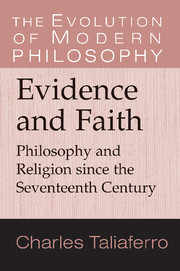Book contents
- Frontmatter
- Contents
- Acknowledgments
- Introduction
- 1 The Sovereignty of the Good in Seventeenth-Century Philosophy of Religion
- 2 Cartesian Philosophy of Religion
- 3 The Ascendancy of Rules of Evidence in Early Modern Philosophy of Religion
- 4 Humean Philosophy of Religion
- 5 Kantian Philosophy of Religion
- 6 Religion and the Philosophical Gods and Giants
- 7 Continental and Feminist Philosophy of Religion
- 8 Five Major Moves
- 9 Religions, Evidence, and Legitimacy
- Appendix A A Guide to Further Study
- Appendix B Select Contemporary Philosophers
- Select Bibliography
- Index
1 - The Sovereignty of the Good in Seventeenth-Century Philosophy of Religion
Published online by Cambridge University Press: 15 December 2009
- Frontmatter
- Contents
- Acknowledgments
- Introduction
- 1 The Sovereignty of the Good in Seventeenth-Century Philosophy of Religion
- 2 Cartesian Philosophy of Religion
- 3 The Ascendancy of Rules of Evidence in Early Modern Philosophy of Religion
- 4 Humean Philosophy of Religion
- 5 Kantian Philosophy of Religion
- 6 Religion and the Philosophical Gods and Giants
- 7 Continental and Feminist Philosophy of Religion
- 8 Five Major Moves
- 9 Religions, Evidence, and Legitimacy
- Appendix A A Guide to Further Study
- Appendix B Select Contemporary Philosophers
- Select Bibliography
- Index
Summary
Divine truth allwaies carried it's own light and evidence; so as that the mind receiving itt is illuminated, edified, satisfied…. It speaks for itt sfelfe, it recommendes itt selfe to its owne enterteinment, by it's owne excellencie. It adde allsoe, that the persuasion of the holie spirit contributes to the minde's assurance and satisfaction.
Benjamin WhichcotePlato and the English Civil War
On March 31, 1647, Ralph Cudworth of Cambridge University addressed the House of Commons in Westminster, England. Civil war had broken out five years earlier. Parliamentary troops had recently occupied Cambridge, and negotiations between king and Parliament were breaking down. In all, the civil war resulted in 190,000 deaths, just under 4 percent of the population, and the decimation of at least 150 towns and villages. In the midst of this political and social turmoil, Cudworth commended a lesson from one of Plato's dialogues: “Virtue and holiness in creatures, as Plato well discourses in his Euthyphro, are not therefore Good, because God loves them, and will have them be accounted such; but rather, God therefore loves them because they are in themselves simply good.” Cudworth told the House of Commons that goodness, not self-love or appetites and desires, is sovereign. To think of God in terms of sheer power is a harmful projection, a base reflection of human vice. Worshiping a God of sheer power, uninformed by goodness, celebrates vanity; it is symptomatic of a community incapable of conceiving of a good that transcends self-will.
- Type
- Chapter
- Information
- Evidence and FaithPhilosophy and Religion since the Seventeenth Century, pp. 11 - 56Publisher: Cambridge University PressPrint publication year: 2005



